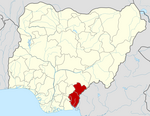Odukpani
Odukpani | |
|---|---|
LGA and town | |
 | |
| Country | |
| State | Cross River State |
| Government | |
| • Local Government Chairman | Justina Edem |
| Time zone | UTC+1 (WAT) |
| Website | www |
 | |
Odukpani is a Local Government Area (LGA) in Cross River State, South-South Nigeria. It lies between latitude 5°4'52.46''N and longitude 8°20'59.7''E and has an elevation approximately 413 ft.[1] It shares a boundary with Calabar (the state capital) and is largely populated by the Efik people.[2]
President Olusegun Obasanjo announced in March 2006 that a 561 megawatt gas turbine power station was to be opened at Ikot Nyong in the LGA.[3] In April 2008, the House Committee on Power and Steel was investigating the power station project, which was only 30% complete and eight months behind schedule, although the contractor had been fully paid.[4]
Settlements in Odukpani include, Akpap Okoyong, Eki, Eniong Abatim, Ito, Idere, Ukwa Ibom, Creek Town, Inuakpa Okoyong, Okurikang. The LGA has approximately a population of 257,800 persons.[5]
The paramount ruler of Odukpani local government area is His Royal Majesty, Etinyin Otu Asuquo Otu Mesembe VI.
Climate
[edit]The climate of Odukpani is tropical humid with wet and dry seasons annual rainfall between 1300-3000mm. These areas are characterized by high temperatures, rainfall, and humidity.[6]
References
[edit]- ^ "Odukpani Town, Popular Town, Prominent town,in Cross River Nigeria Guide". www.nigeriagalleria.com. Retrieved 2018-02-24.
- ^ IDMC : Internal Displacement Monitoring Centre | Countries | Nigeria | Controversy over demarcation between LGAs in the Cross River and Akwa Ibom states caused violence and displacement, 2001
- ^ Obasanjo in Calabar, speaks on 25-year electricity plan The Vanguard, Saturday, March 11, 2006
- ^ Stanley Nkwazema (2 April 2008). "Contractor Overpaid By N.22bn". This Day. Retrieved 2009-12-28.
- ^ "Cross River (State, Nigeria) - Population Statistics, Charts, Map and Location". www.citypopulation.de. Retrieved 2018-02-24.
- ^ Offiong, Priscilla (2019-10-01). "The Social Cost of Climate Change in Nigeria". Climate Scorecard. Retrieved 2023-01-20.
Inuakpa Okoyong

